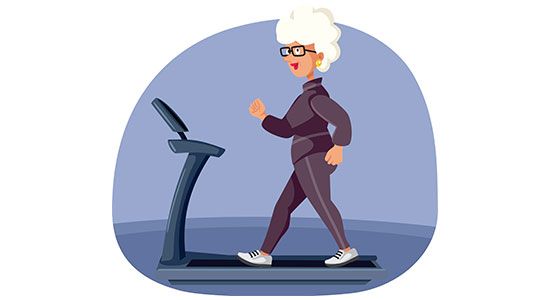Healthy joints are essential to move around comfortably. But, as you get older, you may notice joint pain, limited mobility, and stiffness. It’s natural to experience some of these symptoms as you age.
In a 2022 national poll on healthy aging, over 70% of older US adults reported currently experiencing joint pain. However, it doesn’t mean you can’t do anything about joint pain or keep your joints healthy as you get older.
In this article, we will look at how to keep joints healthy as you age. We will discuss the role of diet and exercise in promoting joint health and how lifestyle changes can help fend off joint pain and other symptoms.
What Makes a Joint Healthy?
Knowing your anatomy is vital for understanding what makes a healthy joint. Your joints are responsible for allowing movement and mobility. They’re between the spaces where bones connect.
Not all joints are the same, though. There are three types of joints, and some have greater freedom than others.
According to researchers, joints can be classified as follows2:
- Fibrous joints that are not movable, also called synarthrosis
- Cartilage joints that are slightly movable, or amphiarthrosis
- Synovial joints that can move freely, called diarthrosis
Healthy joints and bones have cartilages that provide cushioning during movement. With cushioning, your joints can move without problems or stiffness. Also, healthy joints don’t have bone spurs (bony growths that form in joints), which occur when your bones and joint tissues break down.
The Aging Process and Joint Health
A study published in Nature Communications3 offers more comprehensive details of the aging process and joint health. According to the author’s findings, epigenetics – how environmental factors change DNA regulation over time – can affect joint health.
The authors discovered a reduction in Klotho protein, also known as the “longevity protein,” particularly in the cartilages that support knee joints. The Klotho protein regulates ion homeostasis, organ protection, growth factor signaling, and oxidative stress.
While it’s natural for Klotho levels to reduce with aging, this study provides evidence that epigenetics also affects Klotho levels. This means external factors, such as your diet, exercise habits, stress, and surrounding environment, can negatively impact Klotho levels and, as a result, worsen joint health. Therefore, to protect joint health, you must make good external decisions that help maintain Klotho protein, for example, choosing diets and exercises that support joint health.
The Role of Diet in Joint Health
Below, we discuss the importance of a balanced diet in keeping your joints healthy. We will also explore foods that are great for joint health and those that aren’t.
What you eat can impact joint health. It’s not just about a healthy diet, though. You also need to monitor your calorie intake. Weight gain happens when you’re in a calorie surplus, and obesity puts more stress on your joints.
According to the findings of a Wake Forest University study,4 obesity is strongly correlated to osteoarthritis.
Besides maintaining a healthy weight by monitoring calories, you should also include healthy food for joints. Healthy nutrition can promote the longevity of cartilage, lubricant, and other tissues that contribute to their mobility and well-being.
Did you know that some foods can cause inflammation, leading to joint pain? When choosing foods, consider the link between inflammation and degenerative joint diseases.5
A healthy joint diet should ideally include anti-inflammatory foods, such as the following:
- Fatty fish (salmon, anchovies, mackerel, sardines)
- Mushrooms
- Tomatoes
- Berries (Blackberries, raspberries, blueberries, strawberries)
- Avocados
- Peppers
- Turmeric
- Broccoli
- Grapes
Foods to Avoid for Healthy Joints
Some foods harm your joints, and you must avoid such foods. Here is a list of foods to avoid for healthy joints:
- Soda, sports drinks, and other beverages sweetened with sugar
- Fast food, deep-fried foods, potato chips, and other processed foods
- Heavily processed meats, such as ham and bacon
The Benefits of Exercise for Joints
You can have healthier joints with the right exercises. Your goal should be managing weight and building muscles that adequately support your joints.
Exercise is a natural way to relieve joint pain and reduce inflammation. Studies have even found that exercise can help with chronic pain.6
Recommended Exercises for Healthy Joints
There are many exercises for healthy joints, but you must keep your capabilities and limitations in mind. If you’re looking for healthy joints workouts, start by considering if you have existing problems. Start slowly if you’re not used to a daily workout routine.
Here are some exercises that can help:
- Low-impact exercises, such as cycling, walking, and swimming
- Yoga and Pilates
- Strength training, such as lifting weights or working out with resistance bands
Exercise Precautions
It’s important to understand a few exercise precautions for joint health. This can help you avoid injury and ensure your workouts positively impact your joint health.
You should take the following precautions into account:
- Don’t overdo things. Find a good balance that allows you to build supportive muscle tissue without overworking your joints.
- Warm up before you exercise.
- Take five minutes to do a quick cool down after exercising.
- Take off days where you allow your body to rest and recover.
Supplements for Joint Health
Many supplements for joint health exist, but opinions and even evidence surrounding their efficacy differ.
Supplements for healthy joints may improve cartilage health and provide more support for your joints. On the other hand, not all supplements on the market are as effective as they claim to be. Talk to your doctor first before taking any supplements.
Recommended Supplements
If you want the best supplements for joint health, then it’s crucial to keep scientific evidence and research in mind.
The following list of healthy joints supplements is supported by research and studies:
Again, talk to your doctor first before taking any supplements. They can recommend a good supplement based on your unique health history.
Make Lifestyle Changes for Healthier Joints
Weight Management
If you’re overweight or obese, this puts extra pressure on certain joints, such as the knee. Thus, there is a strong connection between weight and joint health.
A healthy diet with an exercise program is a great way to manage your weight. It’s also a combination that will help you learn to have healthy joints naturally. The idea is to balance calories consumed and expended if you’re already on a healthy weight. A calorie deficit is helpful if you’re overweight – but you still need to ensure you get important nutrients in the calories you can eat.
Other Lifestyle Choices
Other lifestyle factors can help you learn how to keep joints healthy as you age.
Here are a few healthy joints lifestyle tips:
- Stress management: Stress releases cortisol, among other hormones, in your body. Acute stress isn’t a problem, but if it becomes chronic, having this consistent cortisol in your body leads to inflammation, which can cause joint pain.
- Sleep: Sleep deprivation results in inflammation and poor dietary choices and is even linked to obesity. These are all things that can negatively affect your joint health.
- Hydration: If dehydrated, it can take a toll on your body. Make sure you drink enough water every day.
Takeaway
Learning to keep joints healthy as you age isn’t as hard as you think. Start with your lifestyle, as there are often factors like eating too many calories, failure to manage your weight, not managing your stress, and having difficulties with your sleep that contribute to poor joint health.
When it comes to knowing how to have healthy joints naturally, you will also need to focus on exercises that strengthen the muscles supporting each joint. Apart from these, the right supplements can also be beneficial. Always consult your doctor before taking any supplements or changing your lifestyle.
















There are no comments yet